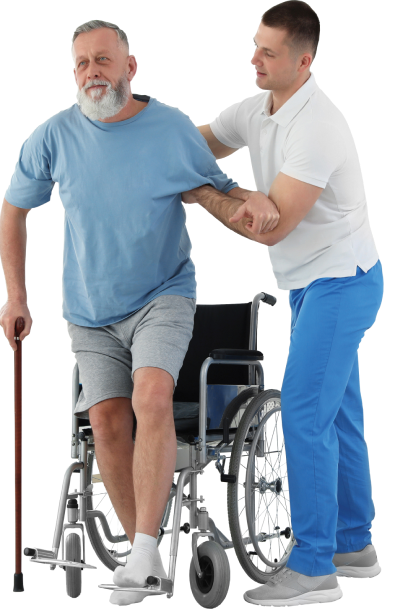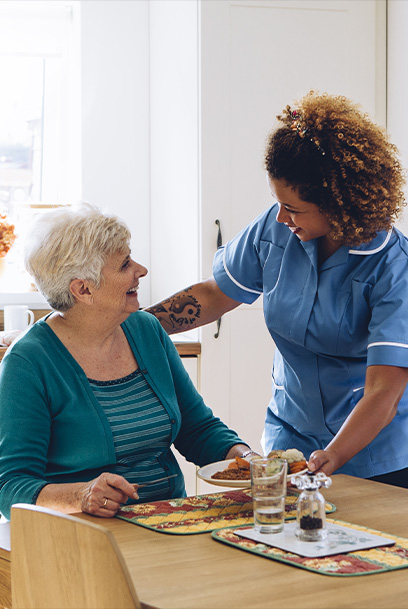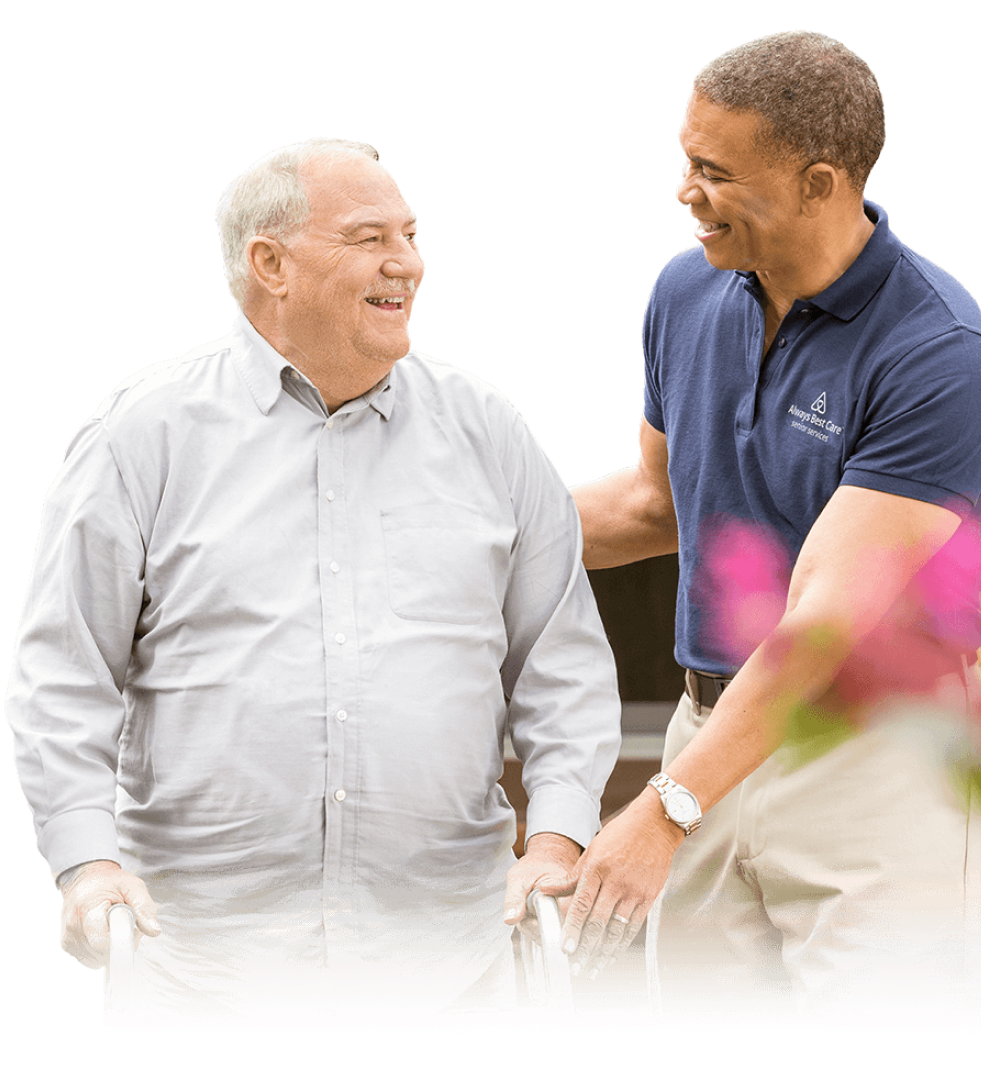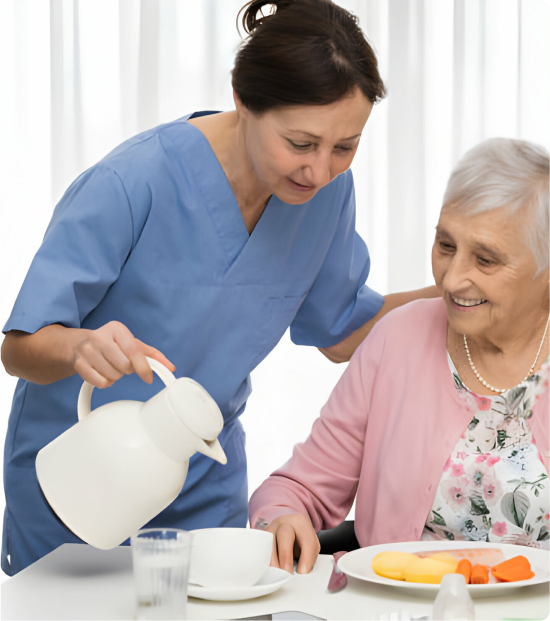This website uses cookies so that we can provide you with the best user experience possible. Cookie information is stored in your browser and performs functions such as recognising you when you return to our website and helping our team to understand which sections of the website you find most interesting and useful.
Home Care In Wahiawa, HI

They say that your golden years are the best years of your life. For most older Americans, that's how it should be - a time to relax, reflect, and live life in a familiar place. After all, senior citizens in the U.S. have worked tirelessly to build a better economy, serve their communities, and raise families.
However, as seniors grow older, completing daily tasks like showering and enjoying activities such as visiting the historic WahiawÄ Botanical Garden gets harder without someone by their side. Unfortunately, many older Americans aren't able to rely on their adult children for help. The reality in today's world is that family members do not have the skills or time to dedicate to caring for their parents. That's where Always Best Care Senior Services comes in.
Our in-home care services are for people who prefer to stay at home as they grow older but need ongoing care that family or friends cannot provide. More and more older adults prefer to live far away from long-term, institutionalized facilities and closer to the place where they feel most comfortable - their home. Home care in Wahiawa, HI is a safe, effective way to give your loved ones the care they need when they need it the most.

 Home Care Services
Home Care Services
- Home Care in Wahiawa, HI
- The Always Best Care Difference
- Types of In-home Care in Wahiawa, HI
- Benefits of Home Care in Wahiawa, HI
- Aging in Place: The Preferred Choice for Most Seniors
- Affordable Care Plans
- Compassionate Care. Trusted Caregivers
- Assisted Living Referral Services
- Taking the First Step with Always Best Care
 Service Areas
Service Areas
The Always Best Care Difference
Since 1996, Always Best Care has provided non-medical in-home care for seniors to help them maintain a healthy lifestyle as they get older. We are proud to have helped more than 25,000 seniors maintain higher levels of dignity and respect. We focus on providing seniors with the highest level of in-home care available so that they may live happily and independently.
Unlike some senior care companies, we genuinely want to be included in our clients' lives. We believe that personalized care is always the better option over a "one size fits all" approach. To make sure our senior clients receive the best care possible, we pair them with compassionate caregivers who understand their unique needs. That way, they may provide care accordingly without compromising their wellbeing.
The Always Best Care difference lies in life's little moments - where compassionate care and trustworthy experience come together to help seniors live a fruitful, healthy life. Whether you are an aging adult that can't quite keep up with life's daily tasks or the child of a senior who needs regular in-home services, Always Best Care is here to help.
“I love how office workers are reachable, friendly & helpful. I would love to get”
“After years of refusing In-home Care due to cost, My dad finally agreed to try”
“I am a current client of this provider They help me out a lot. I have good”
“I am a current client of this provider With my dad's everyday needs, especially bathing they”
“Tyler and his team are great! Love working with them.”
“After hiring the services of Always Best Care for approximately 70 consecutive days, I wanted”
“Always Best Care Senior Services have helped me in caring for my uncle while I”
“The new care we have is the best one I could ever ask for!! ”
“The worker was professional,,caring and punctual.”
“The new care we have is the best one I could ever ask for!! ”
“My aunt has been living in a nursing home for the last five years. In”
“Highly skilled, reliable and loving caregivers. They are the only agency to provide consistent care”
“We feel very blessed to have found Always Best Care! Tyler and his staff are”
“We feel very blessed to have found Always Best Care! Tyler and his staff are”
“Thank you Always Best Care for being a trusted parter with our transportation company. Looking”
“Thank you Always Best Care for being a trusted parter with our transportation company. Looking”
“I am a current client of this provider She will clean and she cooks. I like that”
“I am a current client of this provider She will clean and she cooks. I like that”
“Best home care agency so far! My dad is a was veteran who has been”
“Always Best Care has been caring for my husband for almost a year now. The”
“I highly recommend Always Best Care. When we needed their service, Marcus was able to”
“Staff was very professional and considerate of my needs. Response time and answering my questions”
“The best professional service!!!!”
“I love how office workers are reachable, friendly & helpful. I would love to get a service for them in the future. I worked here as a NA for almost 6 months already and this is the best agency out of 4 agencies I been to. They have a very efficient schedule, good team work, and appreciates or value their workers. I’m proud to say I’m part of this team.”
“After years of refusing In-home Care due to cost, My dad finally agreed to try Always Best Care to take him to see his doctors. At 95, my dad is not an easy person to get along with let alone for a stranger to be with him for a few hours and transporting him, with his walker, to and from the hospital. My dad just called and he is thrilled with his caretaker Madeleine for her kind attitude and helpfulness. I'm relieved that he has found a trusted person that can take him to see his doctors. I began talking to Ernel, the manager, about two months ago regarding this type of service for my dad and we stayed in touch. Ernel was always friendly and professional and was able to get Madeleine for my dad in very short notice. Tita, the administrator, followed up with all the contracts and statements and I'm now enrolled into their online system. Overall, the 5 star rating is well deserved. Aging is not fun. Watching my dad struggle with his daily routine is difficult. Having good people around like Always Best makes it a bit easier for the both of us. Thank you.”
“I am a current client of this provider They help me out a lot. I have good service from them that improves my health.”
“I am a current client of this provider With my dad's everyday needs, especially bathing they have helped. They are easy to work with, get ahold of, and communicate with us well. The people they sent have been good.”
“Tyler and his team are great! Love working with them.”
“After hiring the services of Always Best Care for approximately 70 consecutive days, I wanted to give the company a detailed review. I can honestly say I unequivocally and without hesitation, would recommend Always Best Care as a home health care agency. A vast majority of the caregivers are very conscientious and punctual. The company keeps our family very well informed via their "Family Room" function on their website. The administration and office staff are very thorough and meticulous. Special recognition to office staff (Marina, Abby, and Tita). A+++ company!!!!”
“Always Best Care Senior Services have helped me in caring for my uncle while I get more time to do my other affairs. I know he is in the best care and really appreciate their services.”
“The new care we have is the best one I could ever ask for!! She cares so much for my husband and is always there when he needs her to be. She is truly a angel that was sent to me by your company and I thank you so much for hiring her!! Aloha Jeff & Freda Pohaku”
“The worker was professional,,caring and punctual.”
“The new care we have is the best one I could ever ask for!! She cares so much for my husband and is always there when he needs her to be. She is truly a angel that was sent to me by your company and I thank you so much for hiring her!! Aloha Jeff & Freda Pohaku”
“My aunt has been living in a nursing home for the last five years. In the last year however, we have seen her health and cognitive abilities slowly decline. A social worker asked us to seek extra help from a home care agency to provide additional caregivers due to her growing needs. They provided our family with some options, but in the end, highly recommended Always Best Care. We asked other residents in the facility who were also using ABC, and they too recommended the agency . My aunt has been so pleased with her caregivers and we appreciate the entire staff at ABC. Their communication is outstanding, caregivers are compassionate and reliable and they always go out of their way to accommodate our changing needs. I highly recommend Always Best Care.”
“Highly skilled, reliable and loving caregivers. They are the only agency to provide consistent care for my dad who is receiving VA benefits.”
“We feel very blessed to have found Always Best Care! Tyler and his staff are very helpful, caring and pleasant to work with. I love that they can be reached 24/7 and are quick to find a caregiver for my sweet 90 year old mother, even at the last minute! True to their name, they always give their best care! I highly recommend you check them out! ????”
“We feel very blessed to have found Always Best Care! Tyler and his staff are very helpful, caring and pleasant to work with. I love that they can be reached 24/7 and are quick to find a caregiver for my sweet 90 year old mother, even at the last minute! True to their name, they always give their best care! I highly recommend you check them out! ????”
“Thank you Always Best Care for being a trusted parter with our transportation company. Looking forward to working with you and the wonderful team at ABC in the many years to come.”
“Thank you Always Best Care for being a trusted parter with our transportation company. Looking forward to working with you and the wonderful team at ABC in the many years to come.”
“I am a current client of this provider She will clean and she cooks. I like that the caregiver is on time and she completes her job.”
“I am a current client of this provider She will clean and she cooks. I like that the caregiver is on time and she completes her job.”
“Best home care agency so far! My dad is a was veteran who has been receiving in home care for awhile now. Our past experiences with other agencies have always been inconsistent. It's been difficult finding an agency who can provide experienced and reliable caregivers. However, the VA introduced us to Always Best Care about 6 months ago. Since then, we have been so pleased with the services they've provided. The office staff are so accessible and easy to talk to and the caregivers are second to none. They really enjoy their work and love working for the company. This really says a lot about ABC as a company, who treats their employees well. We feel safe and in good hands.”
“Always Best Care has been caring for my husband for almost a year now. The caregivers are so companionate, respectful and extremely reliable. The office staff are wonderful to work with. They stay in constant communication with my family and are always willing to go above and beyond what they are required to do. I recommended ABC to many of my friends and family members. Thank you!”
“I highly recommend Always Best Care. When we needed their service, Marcus was able to get us set up right away. Their caregivers provide my mom with excellent care. They help her with task around the house, meal prep, exercise, etc. Their staff is very friendly and accommodating. My mom looks forward to seeing them every day. I know my mom is good hands with Always Best Care.”
“Staff was very professional and considerate of my needs. Response time and answering my questions was timely. The services are very affordable. I recommend you contact them at the earliest opportunity to get a medical professional assigned to you & confirmed. I had no issues with them here.”
“The best professional service!!!!”
What is Non-Medical Senior Care in Wahiawa, HI?

Home is where the heart is. While that saying can sound a tad cliche, it is especially true for many seniors living in America. When given a choice, older adults most often prefer to grow older at home. An AARP study found that three out of four adults over the age of 50 want to stay in their homes and communities as they age.

When you begin to think about why, it makes sense. Home offers a sense of security, comfort, and familiarity.

The truth is, as we age, we begin to rely on others for help. When a family is too busy or lives too far away to fulfill this role, in-home senior care is often the best solution. Home care services allow seniors to enjoy personal independence while also receiving trustworthy assistance from a trained caregiver.

At Always Best Care, we offer a comprehensive range of home care services to help seniors stay healthy while they get the help they need to remain independent. As your senior loved one gets older, giving them the gift of senior care is one of the best ways to show your love, even if you live far away.

Types of Elderly Care in Wahiawa, HI
To give our senior clients the best care possible, we offer a full spectrum of in-home care services:

Personal Care Services
If your senior loved one has specific care needs, our personal care services are a great choice to consider. Personal care includes the standard caregiving duties associated with companion care and includes help with tasks such as dressing and grooming. Personal care can also help individuals with chronic conditions like diabetes.
Common personal care services include assistance with:
- Eating
- Mobility Issues
- Incontinence
- Bathing
- Dressing
- Grooming


Home Helper Services
Sometimes, seniors need helpful reminders to maintain a high quality of life at home. If you or your senior has trouble with everyday tasks like cooking, our home helper services will be very beneficial.
Common home helper care services include assistance with:
- Medication Reminders
- Meal Preparation
- Pet Care
- Prescription Refills
- Morning Wake-Up
- Walking
- Reading


Companionship Services
Using this kind of care is a fantastic way to make life easier for you or your senior loved one. At Always Best Care, our talented caregivers often fill the role of a companion for seniors. That way, older adults can enjoy their favorite local activities, such as visiting Ka'ala Neighborhood Park with friends while also receiving the care they need daily or weekly.
Common companionship services include:
- Grocery Shopping
- Transportation to Appointments
- Nutritional Assistance
- Conversation
- Planning Outings
- Completing Errands
- Transportation to Community
- Events and Social Outings


Respite Care Services
According to AARP, more than 53 million adults living in the U.S. provide care to someone over 50 years old. Unfortunately, these caregivers experience stress, exhaustion, and even depression. Our respite care services help family caregivers address urgent obligations, spend time with their children, and enjoy nearby activities. Perhaps more importantly, respite care gives family members time to recharge and regroup. Taking personal time to de-stress reduces the risk of caregiver burnout. So, if you've always wanted to eat at the local Central Oahu Event Center or visit WahiawÄ Freshwater State Recreation Area, don't feel bad. Doing so is great for both you and your loved one.
At the end of the day, our goal is to become a valuable part of your senior's daily routine. That way, we may help give them the highest quality of life possible. We know that staying at home is important for your loved one, and we are here to help make sure that is possible.
If you have been on the fence about non-medical home care, there has never been a better time than now to give your senior the care, assistance, and companionship they deserve.

Benefits of Home Care in Wahiawa, HI
Always Best Care in-home services are for older adults who prefer to stay at home but need ongoing care that friends and family cannot provide. In-home care is a safe, effective way for seniors to age gracefully in a familiar place and live independent, non-institutionalized lives. The benefits of non-medical home care are numerous. Here are just a few reasons to consider senior care services from Always Best Care:
Always Best Care offers a full array of care options for patients at all levels of health. With our trusted elderly care services, your loved one will receive the level of care necessary for them to enjoy the highest possible quality of life.
Request More Information
Aging in Place: The Preferred Choice for Most Seniors
While it's true that some seniors have complicated medical needs that prevent them from staying at home, aging in place is often the best arrangement for seniors and their families. With a trusted caregiver, seniors have the opportunity to live with a sense of dignity and do so as they see fit - something that is unavailable to many older people today.
In-home care makes it possible for millions of seniors to age in place every year. Rather than moving to a strange nursing home, seniors have the chance to stay at home where they feel the happiest and most comfortable.
Here are just a few of the reasons why older men and women prefer to age at home:
How much does a senior's home truly mean to them?
A study published by the American Society on Aging found that more than half of seniors say their home's emotional value means more than how much their home is worth in monetary value. It stands to reason, then, that a senior's home is where they want to grow old.
With the help of elderly care in Wahiawa, HI, seniors don't have to age in a sterilized care facility. Instead, they can age gracefully in the place they want to be most: their home. In contrast, seniors who move to a long-term care facility must adapt to new environments, new people, and new systems that the facility implements. At this stage in life, this kind of drastic change can be more harmful than helpful.
Institutional care facilities like nursing homes often put large groups of people together to live in one location. On any given day, dozens of staff members and caregivers run in and out of these facilities. Being around so many new people in a relatively small living environment can be dangerous for a seniors' health and wellbeing. When you consider that thousands of seniors passed away in nursing homes during the COVID-19 pandemic, opting for in-home care is often a safer, healthier choice for seniors.
Aging in place has been shown to improve seniors' quality of life, which helps boost physical health and also helps insulate them from viral and bacterial risks found in elderly living facilities.
For many seniors, the ability to live independently with assistance from a caregiver is a priceless option. With in-home care, seniors experience a higher level of independence and freedom - much more so than in other settings like a nursing home. When a senior has the chance to age in place, they get to live life on their own terms, inside the house that they helped make into a home. More independence means more control over their personal lives, too, which leads to increased levels of fulfillment, happiness, and personal gratification. Over time, these positive feelings can manifest into a healthier, longer life.
More independence, a healthier life, and increased comfort are only a few benefits of aging in place. You have to take into consideration the role of cost and convenience. Simply put, it's usually easier and more affordable to help seniors age in place than it is to move them into an institutional care facility. According to the US Department of Housing and Urban Development, seniors who age in the comfort of their homes can save thousands of dollars per month.
In-home care services from Always Best Care, for instance, are often less expensive than long-term solutions, which can cost upwards of six figures per year. To make matters worse, many residential care facilities are reluctant to accept long-term care insurance and other types of payment assistance.
With Always Best Care's home care services, seniors and their families have a greater level of control over their care plans. In-home care gives seniors the chance to form a bond with a trusted caregiver and also receive unmatched care that is catered to their needs. In long-term care facilities, seniors and their loved ones have much less control over their care plan and have less of a say in who provides their care.

Affordable Care
In-home care is a valuable resource that empowers seniors to age in place on their own terms. However, a big concern for many families and their loved ones is how much in-home care costs. If you're worried that in-home care is too expensive, you may be pleasantly surprised to learn that it is one of the most affordable senior care arrangements available.
Typically, hiring an Always Best Care in-home caregiver for a few hours a week is more affordable than sending your loved one to a long-term care facility. This is true even for seniors with more complex care needs.
At Always Best Care, we will work closely with you and your family to develop a Care Plan that not only meets your care needs, but your budget requirements, too. Once we discover the level of care that you or your senior need, we develop an in-home care plan that you can afford.
In addition to our flexible care options, families should also consider the following resources to help offset potential home care costs:

Compassionate Care. Trusted Caregivers.
When you or your senior loved one needs assistance managing daily tasks at home, finding a qualified caregiver can be challenging. It takes a special kind of person to provide reliable care for your senior loved one. However, a caregiver's role involves more than meal preparation and medication reminders. Many seniors rely on their caregivers for companionship, too.
Our companion care services give seniors the chance to socialize in a safe environment and engage in activities at home. These important efforts boost morale and provide much-needed relief from repetitive daily routines. A one-on-one, engaging conversation can sharpen seniors' minds and give them something in which to be excited.
At Always Best Care, we only hire care providers that we would trust to care for our own loved ones. Our senior caregivers in Wahiawa, HI understand how important it is to listen and communicate with their seniors. A seemingly small interaction, like a short hug goodbye, can make a major difference in a senior's day. Instead of battling against feelings of isolation, seniors begin to look forward to seeing their caregiver each week.
Understanding the nuances of senior care is just one of the reasons why our care providers are so great at their job.
Unlike some senior care companies, our caregivers must undergo extensive training before they work for Always Best Care. In addition, our caregivers receive ongoing training throughout the year. This training ensures that their standard of care matches up to the high standards we've come to expect. During this training, they will brush up on their communication skills, safety awareness, and symptom spotting. That way, your loved one receives the highest level of non-medical home care from day one.
Assisted Living Referral Services
While it's true that many seniors prefer to age at home, sometimes in-home care isn't the best fit. For those seniors and their families, choosing an assisted living facility makes more sense. Unfortunately, finding the optimal care facility is easier said than done in today's day and age. That's when Always Best Care's assisted living referral services begin to make a lot of sense.
Assisted living is a form of housing intended for seniors who require varying degrees of medical and personal attention. Accommodations may include single rooms, apartments, or shared living arrangements. Assisted living communities are typically designed to resemble a home-like environment and are physically constructed to encourage the independence of residents.

At assisted living communities, seniors receive help with daily activities such as bathing, dressing, and eating. They may also benefit from coordination of services with outside healthcare providers, and monitoring of resident activities to ensure their health, safety, and well-being. Caregivers who work at assisted living communities can also provide medication administration and personal care services for older adults.
Other services offered within assisted living communities can include some or all of the following:
- Housekeeping
- Laundry
- Recreational Activities
- Social Outings
- Emergency Medical Response
- Medication Monitoring
- Family Visitation
- Personal Care

At Always Best Care, our representatives can match your senior's emotional, physical, and financial needs with viable assisted living communities nearby. Results are based on comparative data, so you can select the best choice for you or your loved one.
Always Best Care works closely with local senior living communities to gain valuable knowledge that we then use to help seniors and their loved ones make informed decisions. This information can include basic care and rent, resident availability, and services provided. Because Always Best Care is compensated by these communities, we provide senior living referral services at no extra cost to you.
Some of the most popular assisted living communities to consider in our area include the following:
- Aged To Perfection
- Wahiawa Nursing & Rehabilitation Center
- Lai'ola Elderly Housing
- R & A Care Home
- Wahiawa Silvercrest Apartments

For many seniors, moving into a senior living community revolves around how and when they want to make a transition to more involved care. Some seniors are more proactive about transitioning to independent living. Others choose to remain home until their care needs or other requirements are satisfied. Remember - our staff is here to help. Contact our office today to learn more about assisted living communities and how we can find a facility that exceeds your expectations.

Taking the First Step with Always Best Care
The first step in getting quality in-home care starts with a personal consultation with an experienced Always Best Care Care Coordinator. This initial consultation is crucial for our team to learn more about you or your elderly loved one to discover the level of care required. Topics of this consultation typically include:
A discussion of your needs and how our trained caregivers can offer assistance in the most effective way

A draft of your care plan, which includes highly detailed notes and a framework for the care that you or your senior will receive

Discuss payment options and help coordinate billing with your insurance provider

Our caregivers are trained to spot changes that clients exhibit, like mental and physical decline. As your trusted senior care company, we will constantly assess and update your Care Plan to meet any new emotional, intellectual, physical, and emotional needs.
If you have never considered in-home care before, we understand that you and your family may have concerns about your Care Plan and its Care Coordinator. To help give you peace of mind, know that every team member and caregiver must undergo comprehensive training before being assigned to a Care Plan.
At the end of the day, we only hire the best of the best at Always Best Care. Whether you need home care in Wahiawa, HI 24-hours a day or only need a respite for a couple of hours, we are here to serve you.
When you're ready, we encourage you to contact your local Always Best Care representative to set up a Care Consultation. Our Care Coordinators would be happy to meet with you in person to get to know you better, discuss your needs, and help put together a personalized Care Plan specific to your needs.

Latest News in Wahiawa, HI
Harsher penalties a possibility for Wahiawa attack suspect, victim’s attorney says
Dillon Anchetahttps://www.hawaiinewsnow.com/2025/05/24/harsher-penalties-possibility-wahiawa-attack-suspect-victims-attorney-says/
HONOLULU (HawaiiNewsNow) - Many are wondering why the charges were dropped against an 18-year-old woman who was allegedly seen on video in a brutal Wahiawa attack.The attorney for the victim’s family says the initial charges against the suspect were dropped as prosecutors explore potentially harsher offenses.The motion filed and granted in court Thursday got the case di...
HONOLULU (HawaiiNewsNow) - Many are wondering why the charges were dropped against an 18-year-old woman who was allegedly seen on video in a brutal Wahiawa attack.
The attorney for the victim’s family says the initial charges against the suspect were dropped as prosecutors explore potentially harsher offenses.
The motion filed and granted in court Thursday got the case dismissed without prejudice, leaving the door open for charges in the future.
The attorney for the victim’s family previously told Hawaii News Now they were exploring all of their options as the investigation plays out.
Three other juvenile suspects have also been released pending investigation. Authorities have not explained the charges they could face, if any.
The video sent shockwaves of anger and heartache through the community.
“It really made Leilehua and just Wahiawa in general have a bad look. And people look at it bad, which is disappointing because I know this is a good town,” said Leilehua Class of 2025 graduate Kea Conjugation.
His mom, a retired teacher, shared the sentiment.
“Knowing the students, knowing the community, and watching social media, it still hurts,” Jody Conjugation said. “Nobody likes this feeling hanging over us. I think the whole community has a heavy heart right now and it’s just trying to heal and move forward because Wahiawa is a really good place to live. There’s a lot of good people here and sometimes the stigma of certain incidents will make it seem like people just focus on that. But it’s a good place to live.”
The family of victim Carly Ng released another statement Friday, saying their first priority is to love Carly and tend to her physical and mental well-being.
Her glasses, which were broken in the attack, were replaced and generous donors have offered to provide a second pair.
“The family will navigate through this with professional help and would like to help any victims that are going through bullying alone by providing a roadmap to navigate the process. They don’t want to see this happen to any other family in Hawaii,” the statement said.
They continue to feel the love and support from the community, and hope to start a program that helps victims of bullying, the statement also said.
Donations of goods and services are being organized through the family’s attorney, Carolyn Hayashi, who can be reached at (808) 522-5133 or [email protected].
This GoFundMe account, organized by Mahi Crabbe is also another resource the family plans to utilize in their mission.
According to a letter from the complex area superintendent, the people involved were students at Wahiawa Middle and Leilehua High schools.
They were barred from campus the rest of the year, meaning the 18-year-old suspect was not allowed to walk at Friday’s graduation. The ceremony moved ahead with extra security.
“I think it’s fair and I think she’ll think about her actions and learn from it and what she needs to do,” Jody Conjugation added.
The apologies from the suspect and her family also haven’t been well received.
“I don’t think it sounds genuine because in the video you could see her like laughing, looking like she’s having a fun time, so it just looks like she’s doing that just cause all the backlash she’s facing now,” Kea Conjugation said.
While the shadow of this attack looms over the Wahiawa community, some are hoping to find a path forward as many looked to celebrate Leilehua graduates on their big night.
“I just hope everyone has a good time. It is a very big moment for all of us and I just want everyone to look forward to the future and just keep pushing,” Kea Conjugation said.
Copyright 2025 Hawaii News Now. All rights reserved.
Disclaimer:


 808-207-8558
808-207-8558





